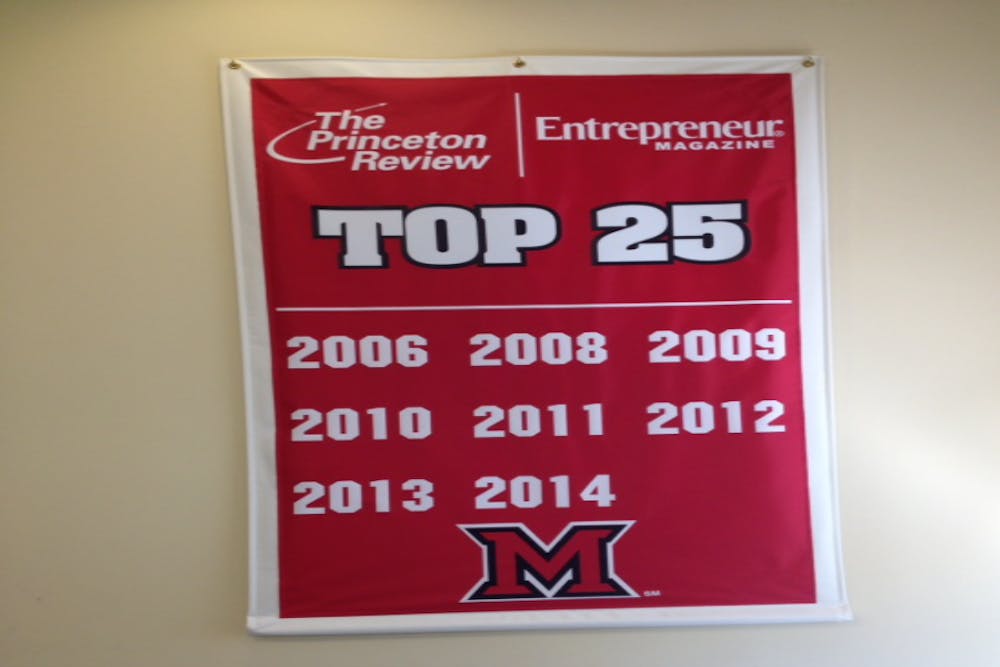FSB program ranked top 25 for six years
By Libby Mueller, Senior Staff
Miami University's Institute for Entrepreneurship is home to all different kinds of people with one thing in common: They are not satisfied with the status quo. They want to change the world.
The Princeton Review and Entrepreneur magazine recently released the results of an annual Princeton Review survey that rates the top 25 undergraduate and the top 25 graduate schools with the best entrepreneurship programs nationwide. Appearing on the list for each of the last six years and coming in at number 10 on the undergrad list this year was Miami University's Institute for Entrepreneurship at the Farmer School of Business (FSB).
Jim Friedman, Professor of Creativity within the Institute for Entrepreneurship, said entrepreneurship is not so much an action or a field of practice, but rather a state of mind.
"Entrepreneurship is a mindset," Friedman said. "There's a joke that an entrepreneur is a person who works 100 hours a week so he doesn't have to work 40 hours a week."
Recently, the Institute for Entrepreneurship developed a new curriculum that focuses on creativity. Director of the Institute for Entrepreneurship Brett Smith headed the curriculum initiative.
"Brett sat us all down a few years ago and said if we were going to start teaching entrepreneurship from scratch, start all over again with a clean slate, what would we want to teach? How can we best prepare the entrepreneurs of the future?" Friedman said. "We have redesigned the curriculum to provide a very solid foundation."
According to Friedman, the results of the 2010 IBM Global CEO Study, a survey of over 1,500 Chief Executive Officers across the globe, found that creativity is one of the attributes CEOs value most in their employees.
"In the IBM study a couple years ago, 1,500 CEO businessmen were asked what the most important thing was for college students to have when they graduate and the answer was overwhelmingly we need them to think more creatively," Friedman said. "The entrepreneurship program took that seriously. They put a whole curriculum around it."
The creativity track is not the only route for students majoring in entrepreneurship. They can also choose startup, social or corporate entrepreneurship as their focus.
"Some people are interested in entrepreneurship because either they want to start their own business or they want to work in a new, young small business," Friedman said. "Or they can go in the direction of social entrepreneurship where either they want to start their own nonprofit organization or effectively work in somebody else's social organization."
Friedman said corporate entrepreneurship is also known as "intrepreneurship," a way of thinking outside the box within big businesses.
"You can go into major corporations that need to innovate in order to stay ahead of their competition. They need intrepreneurs," Friedman said.
The Institute for Entrepreneurship, although it resides in FSB, has opened wide its doors to students of any major, from journalism to engineering.
"We have students from 80 different majors taking our classes," Director Brett Smith said. "One key thing most people misunderstand about entrepreneurship is that it's about starting a business. We do it as a mindset and a set of activities that can be applied anywhere."
Learning how to apply the entrepreneurial mindset requires a different class format than that which MU students are used to. Entrepreneurship classes are all about the hands-on learning experience, according to Friedman.
"The motto of the institute is, 'Live it,'" Friedman said. "You don't come into an entrepreneurship class and expect to sit in a classroom and take notes. You're going to have hands-on experiences working with clients and customers and changing people's lives."
Both Smith and Friedman said student success in the entrepreneurship program can mean many different things. The Head of Global Operations at Uber, the mobile rideshare service, came through MU's Institute for Entrepreneurship program, Smith said.
Other successes include former student Ashley VanBuskirk's social entrepreneurial venture Flora, a company that sells notebooks from which the proceeds go to women's education in Kosovo.
But success does not necessarily mean success in the traditional sense. It can also include failure, Friedman added.
"The great thing about entrepreneurship is [you learn to] fail well," Friedman said.
Senior Hannah Wheeler has an International Studies major and an Entrepreneurship minor. She is most interested in social entrepreneurship, but said she has had experience in her entrepreneurship classes working with both social and corporate business clients.
"In Social Entrepreneurship, I had the opportunity to work with Ashley VanBuskirk with Flora," Wheeler said. "Something signature to the entrepreneurship program is real-world experience in every class. I learned what it's like to work with a startup that has little resources but big success. I also did some marketing for BucketFeet in Entrepreneurial Marketing."
Wheeler said she wants to go into humanitarian work after college and her entrepreneurship classes have prepared her for that. Currently, she is taking Creativity and Organization.
"I'd like to work in the humanitarian field after graduation and I am learning a lot in my creativity class with Dr. Friedman that will impact my leadership skills there," Wheeler said. "I'm learning how to think creatively in any environment I'm in."
Students and staff involved with MU's entrepreneurship program firmly believe that no matter what field you go into, you can be a true entrepreneur.
"Entrepreneurs are driven by passion. Entrepreneurs are world-changers," Friedman said. "There are three types of people in the world. There are people who make things happen, people who watch things happen and people who sit around and say, 'What happened?' Entrepreneurs make things happen."

